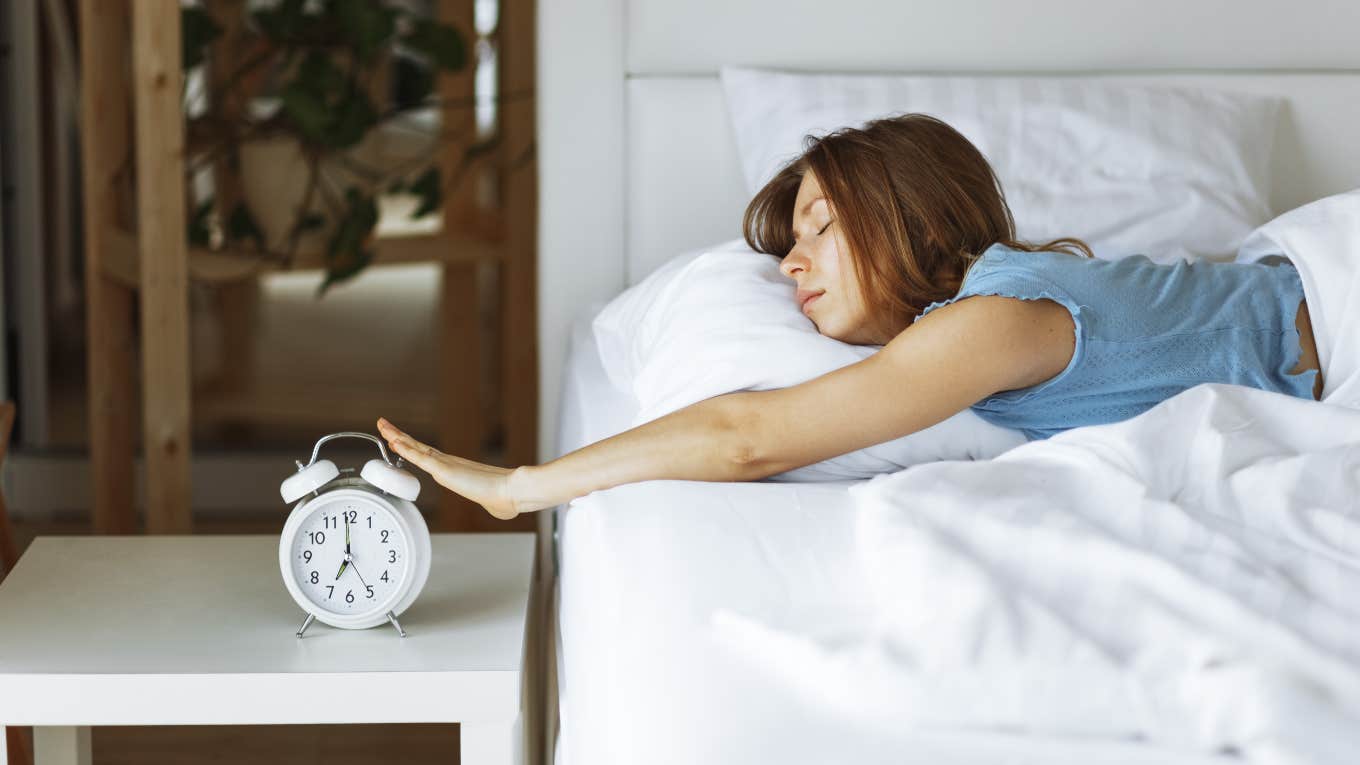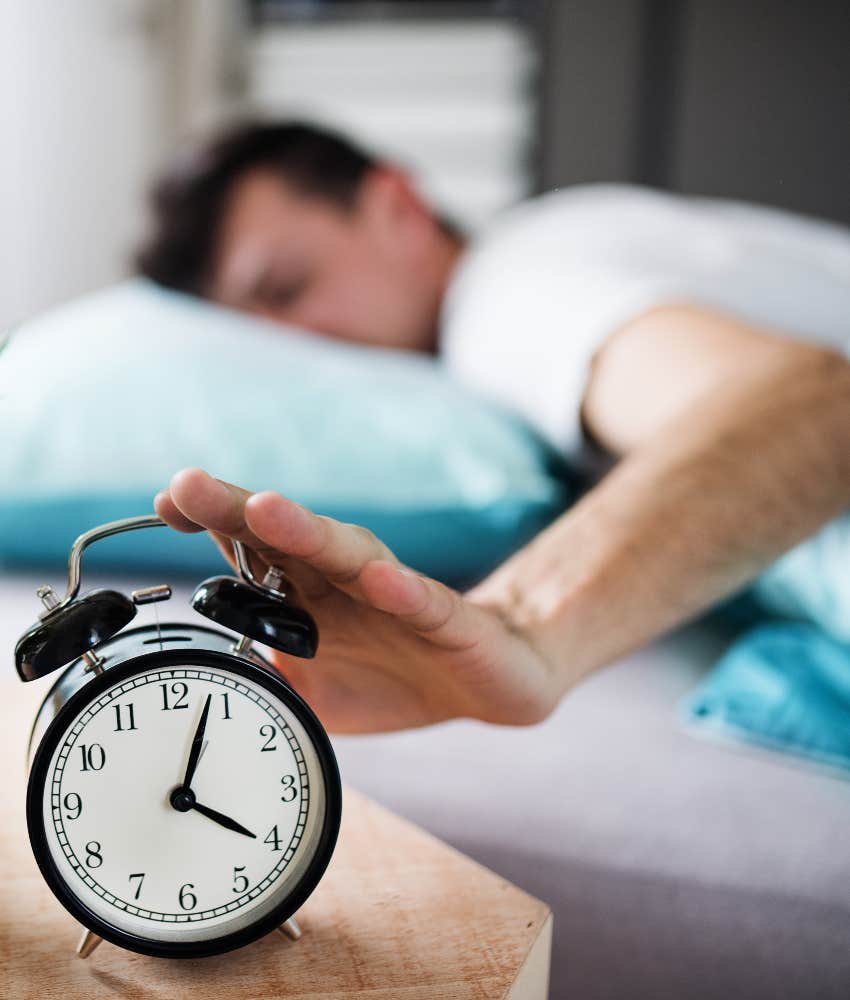Wellness Expert Warns Us Not To Set Multiple Alarms To Wake Up In The Morning
Repeatedly snoozing your morning alarm is making you more sleep-deprived.
 Alina Bitta | Shutterstock
Alina Bitta | Shutterstock For many, waking up in the morning is the hardest part of the day. After a night of deep sleep, waking up and getting ready for another day can sometimes feel impossible, as can leaving the addictive warmth and comfort of a cozy bed. So much so, that some people require multiple alarms to gradually get up in the morning.
However, according to one wellness expert and various studies, this multi-alarm routine is more harmful to our sleep than we realize.
A wellness expert revealed why you shouldn't set multiple alarms to wake up in the morning.
Jordan Bruss uses her social media platform to promote health and wellness content. She recently warned viewers on TikTok of the lesser-known effects of using multiple alarms to get up in the morning.
“If you’re somebody who sets multiple alarms, I have bad news for you,” she began her video. “Waking to multiple alarms every morning really disrupts your REM cycle frequently.”
According to Headspace Group, this routine of being forced awake repeatedly in the morning during REM sleep can impact your daily performance, memory consolidation, and learning.
“This actually causes sleep inertia, increased drowsiness, fatigue, mood swings, and it also raises your cortisol levels,” Bruss detailed. “Every time your alarm goes off, you’re in that fight or flight response, so waking up like that multiple times in the morning is very stressful.”
People might assume that setting multiple alarms in the morning helps them gradually wake up while getting some extra minutes of sleep in between, but this actually only makes individuals feel more tired and sluggish.
“Trying to go back to sleep with the snooze button, only to be awoken again five minutes later, is confusing your body and brain. It isn’t part of your sleep cycle, and hence, it does no good whatsoever,” Headspace Group wrote.
In another video, Bruss suggested three steps that individuals can follow to stop relying on multiple alarms in the mornings.
After various TikTokers expressed how challenging it is for them to wake up from one alarm when snoozing has become an addictive habit, Bruss offered additional actions to improve the quality of their sleep.
Bruss said the first step individuals should take is maintaining a regular circadian rhythm.
“This will help your body naturally regulate a sleep cycle,” she explained. “This means you have to go to bed at the same time and wake up around the same time every day, even on your days off, so that you have a rhythm.”
She further encouraged viewers to recognize that the human brain is malleable and know that they are capable of molding their brains into forming new habits.
“Rewiring your brain takes a little bit of work and a lot of consistency, and I promise you will get there,” she said.
Bruss additionally advised individuals to consider leaving their phones on the other side of their rooms so they are forced to get up to turn their alarms off in the morning. This may not be the most favorable option, but it can certainly help.
“You’re going to hear it eventually, even if it’s going on for five minutes, and if you have to physically get out of bed, stay out of bed,” Bruss said.
Although it will be challenging to adjust to using only one alarm, it will benefit you in the long run.
There are several reasons why people repeatedly hit snooze on their alarms in the morning. Some are heavy sleepers who don’t hear their first alarms, while others don't even realize they hit snooze while they’re half asleep.
Many people may argue that they need multiple alarms in the morning because they are so sleep-deprived, but this habit will only inhibit you from getting the rest you need.
Rather than snoozing your alarms every five to ten minutes for half an hour in the morning, consider just setting one alarm at the time you need to wake up, and you’ll likely feel much more rested without the staggered interruptions.
“When that alarm goes off in the morning, get up! Don’t keep traumatizing yourself,” Bruss emphasized.
 Ground Picture | Shutterstock
Ground Picture | Shutterstock
After that alarm goes off, find helpful ways to ease the transition of waking up, whether that be drinking a glass of water, starting the day with some stretches, or just using the bathroom.
My personal hack as a teenager who had to wake up at 5 a.m. every morning for school was doing 10 jumping jacks as soon as my alarm went off. This may seem torturous, but starting the day off with a light activity helped to awaken my mind and body.
Adjusting to the use of one alarm may feel impossible at first, but once you get past that first week, it will only get easier. Eventually, your mind and body will naturally get used to waking up at the same time in the mornings, and you’ll thank yourself for the change.
Francesca Duarte is a writer on YourTango's news and entertainment team based in Orlando, FL. She covers lifestyle, human-interest, adventure, and spirituality topics.

